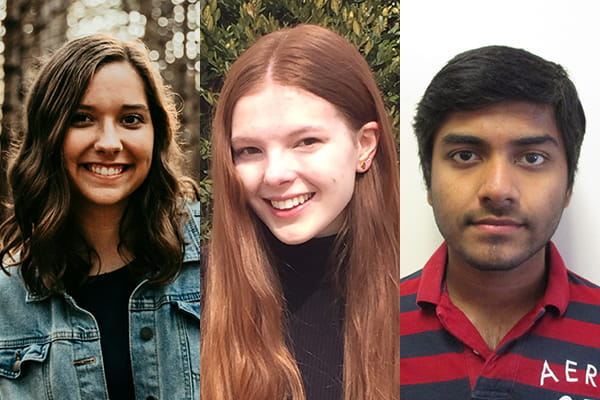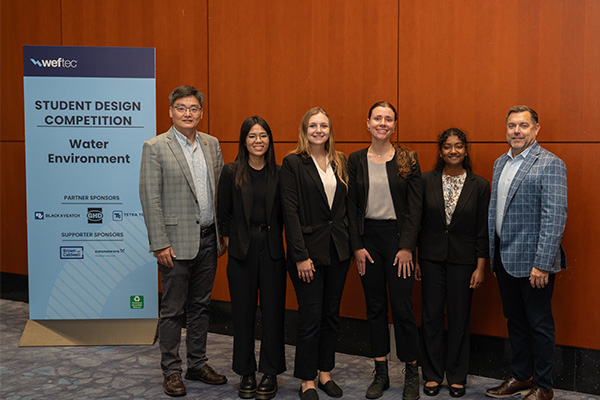Nine McKelvey Engineering students named inaugural Chancellor’s Career Fellows
The McKelvey Engineering students will receive career guidance, summer stipend

Nine first- and second-year students in the McKelvey School of Engineering are among the inaugural members of Chancellor Andrew D. Martin’s Career Fellows Program to increase career access for WashU students.
The McKelvey Engineering students are among the 61 students selected for the inaugural class of the Chancellor’s Career Fellows Program, designed to provide low-income and first-generation students with career planning and coaching and funding to cover a summer professional development experience. The program, which has come together in less than a year, is administered by the Division of Student Affairs through the Career Center, with assistance from the Office for Student Success, the Office of Scholar Programs and Student Financial Services.
The McKelvey Engineering students in the program are:
- Martin Trujillo Carrazco, a sophomore majoring in computer science
- Kevin Chen, a sophomore majoring in computer science
- Destiny Davis, a first-year student majoring in computer science
- Isabelle Gilliam, a first-year student majoring in mechanical engineering
- Seungah (Lisa) Han, a sophomore majoring in business and computer science
- Chloe Haynes, a sophomore majoring in computer science
- Reedham Kalariya, a first-year student majoring in systems engineering
- Caleb Martonfi, a first-year student majoring in chemical engineering
- Yizhe Zhang, a first-year student
The program is part of the university’s overall effort to increase and support the number of first-generation college students and those from families with lower incomes. Martin created the WashU Pledge, which provides admitted low-income students from Missouri and southern Illinois a free Washington University education, and directs the university to move toward need-blind admissions. In 2021, 600 undergraduate students, including 11 percent of the Class of 2024, are the first in their families to attend college.
The program is designed to get students more focused on the pathways and social networks leading to the world of work and graduate school and to provide similar coaching for post-university life that students with more resources have, said Robyn Hadley, associate vice chancellor for student affairs and dean of the Office of Scholar Programs.
“It’s a pathway to better understanding how to use one’s academic experiences to create a resume and present oneself into the workforce,” Hadley said. “It can be hard to do as a first-year student and a sophomore when you’re not sure what you’re interested in academically. Part of the lesson is learning more about the world of work, and by going through this process, these students will be better equipped to seek out internships and network on their own in the future.”
Students selected for the fellows program had to be a first-year student or a sophomore, a full-time degree-seeking student and come from a family with $75,000 or less in annual income. Nearly 170 students applied, and 25 of those were McKelvey Engineering students.
This spring, fellows are participating in a one-credit career education course, taught by Carol Moakley, associate director of career development, and Michelle DeLair, assistant director of career development, and will participate in a student-to-student networking event. Over the summer, students will complete an internship, research experience or other professional development opportunity covered by a stipend of up to $5,000, as well as participate in a one-credit course.
Throughout the program, students will establish mentoring relationships with WashU alumni, learn to do a budget and have access to personalized career advising toward the summer experience.
Isabelle Gilliam, a first-year student majoring in mechanical engineering, said it was an honor to be chosen for the program. She is looking forward to expanding her network.
“I feel this program would allow me to learn from people in many different industries who have already been where I am and could help give me guidance on which paths I should take to have success in my field,” she said.
So far, the program has been a great experience for Gilliam.
“I have learned many tangible skills, such as how to create a professional LinkedIn profile, how to organize a job search, and how to portray myself well in a resume,” Gilliam said. “I have also learned more abstract skills such as how to assess my own strengths and weaknesses and how to know what I want and need in a career.”
Reedham Kalariya, a first-year student majoring in systems engineering with pre-medicine and biophysics interests, was interested in the program to explore the different opportunities available, to interact with a supportive community, and to consider how he could shape his career as a potential researcher, as well as for professional skills development.
“I have learned how to use my activity on LinkedIn to my advantage to interact with more people out there with the capability to connect me with significant, mentoring experiences, Kalariya said. “I learned how to keep myself connected with interest groups of fields I am interested in, which would help me find potential networking opportunities, essential to present myself as an active, enthusiastic candidate for an opportunity. Additionally, I learned how I can use other established individuals as models to slowly pave my career.”
Kalariya said the program expanded his options for productive summer opportunities.
“Initially, my options would have been limited to Summer Undergraduate Research Experiences that gave a stipend or such available paid job,” he said. “However, with the aid available, I am able to expand my horizon and explore opportunities which I would not have previously considered because of the financial restrictions.”
Chloe Haynes, a sophomore majoring in computer science, is looking forward to the opportunities for growth presented to her through the program.
“Participating in a group of students who are all trying to discover a small part of their paths, where we can learn not only together but also from each other, was an idea that sounded so special to me,” said Haynes, who is the first in her family to attend college.
Already, she has learned a fundamental truth about life.
“So far, I have learned that being successful is rarely a straight path,” Haynes said. “While this is something that you always hear, it is especially something that I’ve grown to understand from being in this program. It has taught me – and made me truly believe – that doors can open where and when you least expect.”



